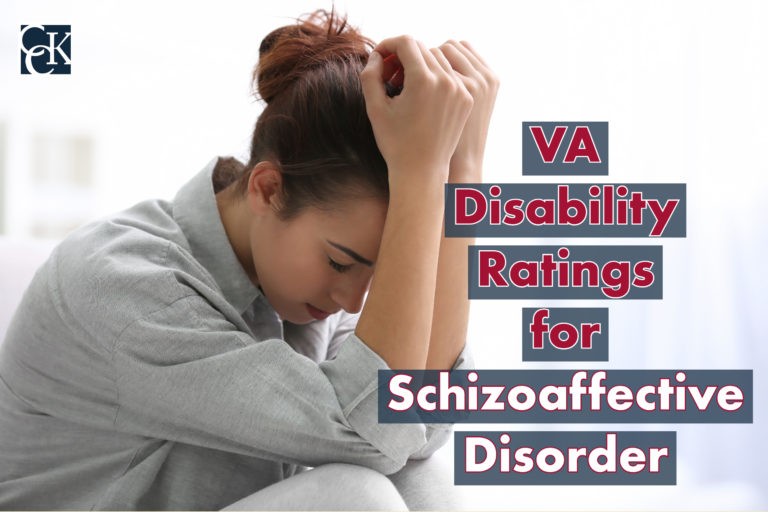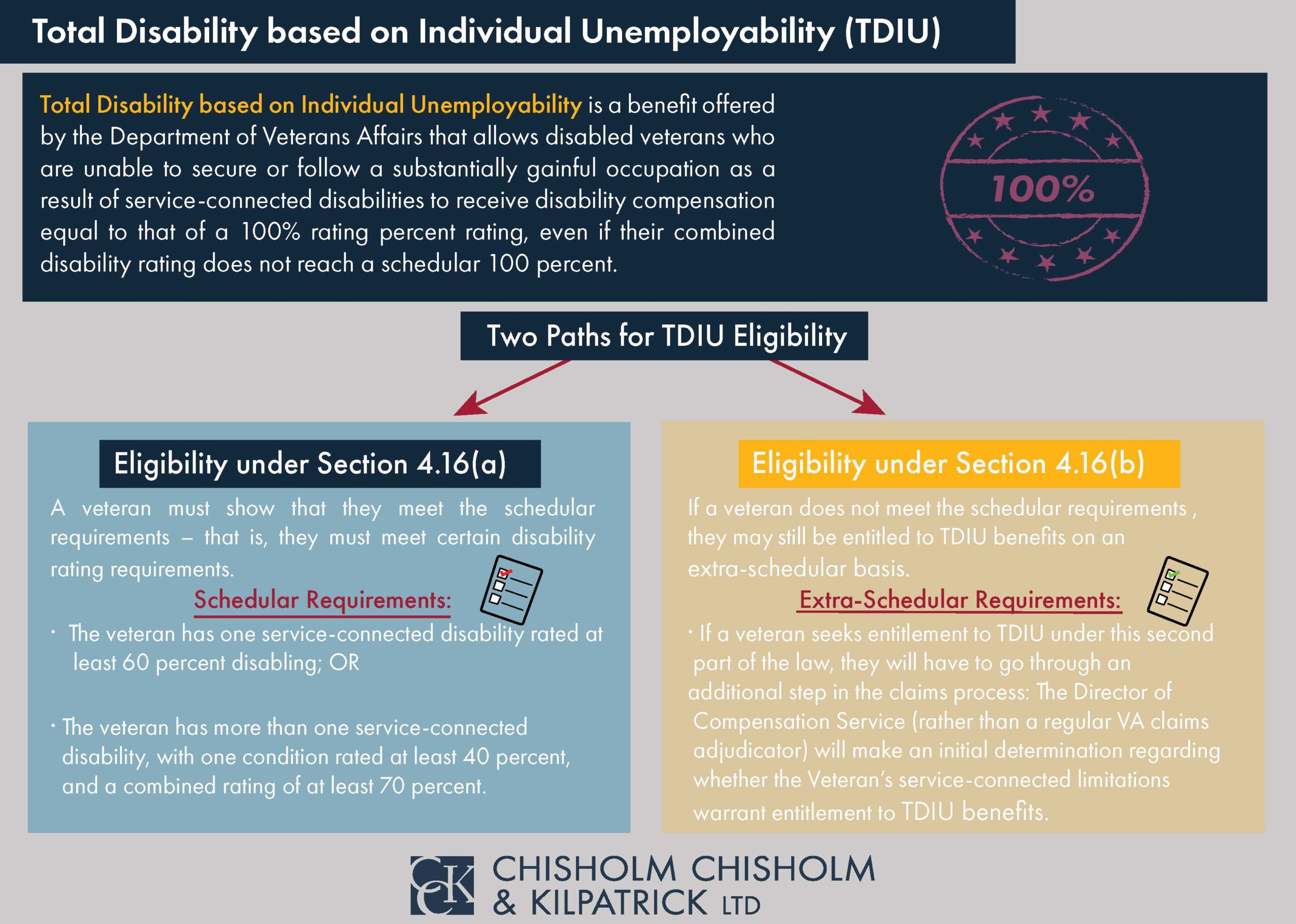VA Disability Ratings for Schizoaffective Disorder

What Is Schizoaffective Disorder?
Schizoaffective disorder is a chronic mental health condition that is characterized by features of schizophrenia (e.g., hallucinations or delusions) and a mood disorder (e.g., bipolar disorder or depression). The prefix “schizo” refers to psychotic symptoms affecting a person’s perceptions, sense of self, and thinking, while “affective” refers to extreme mood, energy, or behavioral shifts.
There are two major types of schizoaffective disorder:
- Bipolar type – Those with bipolar schizoaffective disorder experience dramatic “highs” (i.e., manic episodes) and “lows” (i.e., depressive episodes).
- Depressive type – Those with depressive schizoaffective disorder experience only depressive episodes.
Since it can be difficult to distinguish and is a relatively rare condition, individuals with schizoaffective disorder are often misdiagnosed with schizophrenia or bipolar disorder. The prevalence of schizoaffective is unknown.
Symptoms of Schizoaffective Disorder
Schizoaffective disorder usually manifests in adolescence or young adulthood, and can lead to difficulty functioning in work, school, and social settings. Some common symptoms include:
- Hallucinations
- Delusions (i.e., strongly held false beliefs)
- Disordered thinking and concentration
- Inappropriate emotional responses
- Erratic speech and behavior
Manic episodes are marked by increased energy and activity, restlessness, feelings of euphoria, inability to sleep, and overall reckless behavior. Depressive episodes are characterized by low energy, sadness, feelings of hopelessness and worthlessness, and inability to function in everyday life.
What Causes Schizoaffective Disorder?
Studies suggest that first-degree relatives of individuals with schizoaffective disorder have an increased risk of developing the illness, as certain genetic variations may contribute to developing mental conditions like schizoaffective disorder. It can be hard to differentiate which genetic variations are specific to this disorder since it closely overlaps with other disorders.
Certain stressful or traumatic events can trigger schizoaffective disorder in those with an increased risk. For example, many veterans develop schizoaffective disorder in connection to their military service.
Treating Schizoaffective Disorder
Treating and managing the disorder usually involves a combination of medication and psychotherapy. About 93 percent of those with schizoaffective disorder take antipsychotics to manage their delusions, hallucinations, and other symptoms. In some cases, mood-stabilizers and antidepressants are also prescribed.
Psychotherapy treatment may involve individual therapy, family therapy, and psychoeducational programs.
Service Connection for Schizoaffective Disorder
To receive U.S. Department of Veterans Affairs (VA) disability compensation for their condition, veterans must establish service connection. To confirm service connection, VA requires evidence of these three things:
- An in-service event, injury, or illness;
- A current diagnosis by a medical professional; and
- A medical nexus, or link, between the in-service event and current diagnosis.
If the veteran did not have an active schizoaffective episode while in service, it can be more difficult to prove that the condition is directly related to service. However, veterans can show evidence (e.g., service records, medical records, lay evidence) of prodromal symptoms (i.e., early symptoms of schizoaffective disorder) that occurred during service. Examples of prodromal symptoms include isolation, increased anxiety, changes to normal routine, neglecting personal hygiene, difficulty concentrating, and more.
Veterans can submit a claim for VA disability benefits on VA Form 21-526EZ. This can be submitted via mail to the Evidence Intake Center or electronically through VA’s website.
Schizoaffective disorder is rated under the General Rating Formula for Mental Disorders – CFR § 4.130, diagnostic code 9211. VA rates mental disorders (except eating disorders) at 0, 10, 30, 50, 70, or 100 percent disabling.
Importantly, veterans with this disorder do not need to exhibit every single symptom listed in the rating criteria to receive that disability rating. Symptoms listed are simply meant to serve as examples of the level of impairment for that rating.

The schizoaffective disorder VA rating criteria are as follows:
100 percent – The veteran’s schizoaffective disorder is so severe that it affects all aspects of their functioning, and includes symptoms such as:
- “Gross impairment in thought processes or communication; persistent delusions or hallucinations; grossly inappropriate behavior; persistent danger of hurting self or others; intermittent inability to perform activities of daily living (including maintenance of minimal personal hygiene); disorientation to time or place; memory loss for names of close relatives, own occupation, or own name.”
70 percent – The veteran’s condition is slightly less severe than that of a 100 percent rating, and includes symptoms such as:
- “Suicidal ideation; obsessional rituals which interfere with routine activities; speech intermittently illogical, obscure, or irrelevant; near-continuous panic or depression affecting the ability to function independently, appropriately and effectively; impaired impulse control (such as unprovoked irritability with periods of violence); spatial disorientation; neglect of personal appearance and hygiene; difficulty in adapting to stressful circumstances (including work or a work like setting); inability to establish and maintain effective relationships.”
50 percent – The veteran’s condition interferes with their ability to function daily, and includes symptoms such as:
- “Flattened affect; circumstantial, circumlocutory, or stereotyped speech; panic attacks more than once a week; difficulty in understanding complex commands; impairment of short- and long-term memory (e.g., retention of only highly learned material, forgetting to complete tasks); impaired judgment; impaired abstract thinking; disturbances of motivation and mood; difficulty in establishing and maintaining effective work and social relationships.”
30 percent – The veteran generally functions to a standard degree, with some days that are worse than others, and includes symptoms such as:
- “Depressed mood, anxiety, suspiciousness, panic attacks (weekly or less often), chronic sleep impairment, mild memory loss (such as forgetting names, directions, recent events).”
10 percent – The veteran’s symptoms are generally mild and only occur during times of high stress.
0 percent – The veteran is formally diagnosed with schizoaffective disorder but does not experience severe enough symptoms to interfere with their occupational or social functioning.
TDIU for Schizoaffective Disorder
Veterans who are unable to work due to schizoaffective disorder may qualify for total disability based on individual unemployability, or TDIU. This VA disability benefit compensates veterans at the 100 percent rate if their combined disability rating is less than 100 percent but their condition still prevents them from obtaining and maintaining substantially gainful employment.
To qualify for TDIU under 38 CFR § 4.16a, veterans must have:
- One condition rated at least 60 percent; or
- Two or more conditions combing to 70 percent, with one condition rated at least 40 percent.
Veterans who do not meet these minimum rating requirements still have the option to qualify for TDIU on an extraschedular basis under 38 CFR § 4.16b. In this case, veterans must prove their condition uniquely hinders their ability to secure substantially gainful employment and therefore cannot be rated using VA’s standard rating criteria.
Was Your Claim for Schizoaffective Disorder Denied?
If VA denied your claim or rated you incorrectly, Chisholm Chisholm & Kilpatrick LTD may be able to help. The experienced veterans’ advocates at CCK have decades of experience successfully representing veterans and appealing VA decisions.
For a free case evaluation, reach out to CCK today at 401-251-0687 or through this online contact form.
About the Author
Share this Post

